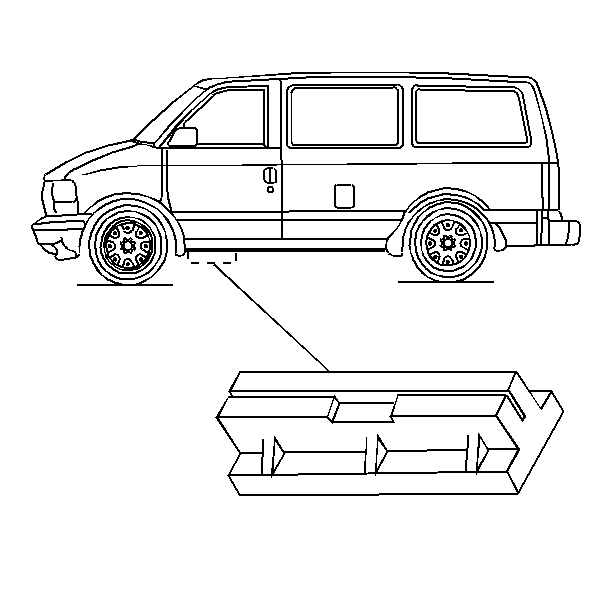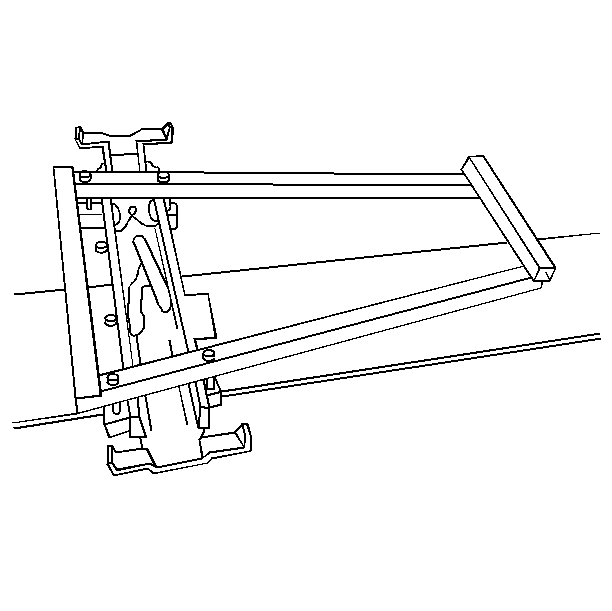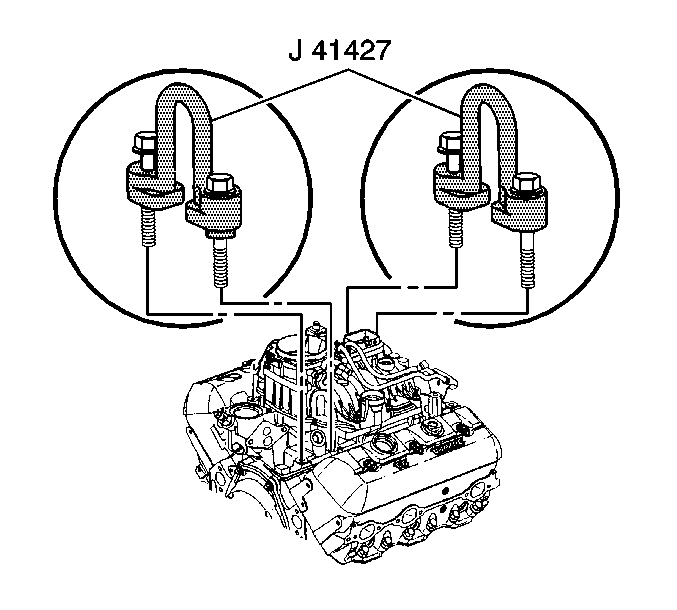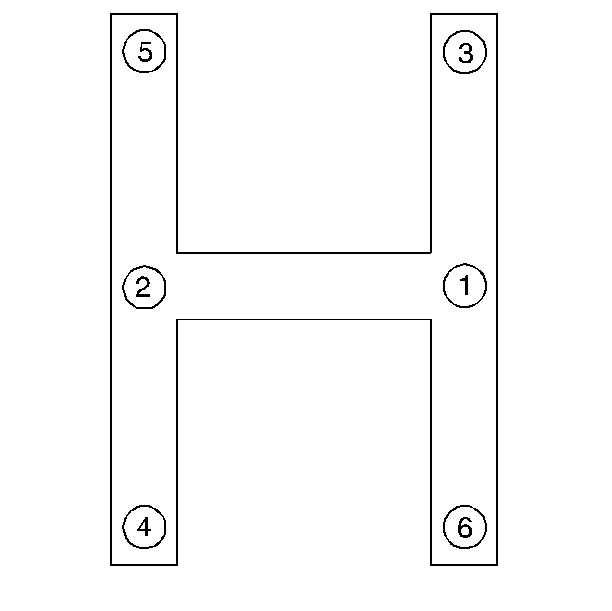Removal Procedure
Tools Required
| • | J 41602 Body
Protection Hoist Adapter Set |
| • | J 41617 Twin
Post Hoist Frame Assembly Support Bar |
Notice: This procedure must performed on a side lift hoist or a twin post hoist.
The engine and mounting frame will be removed out of the bottom of the vehicle,
therefor, a single post hoist can not be used to perform this procedure.
Notice: Failure to flush out the oil cooling system or the engine cooling system
may result in premature failure of the replacement engine.
If the engine is damaged internally and a new engine is installed, make
sure that all foreign material is completely flushed out of the cooling system.
The oil cooler system should also be flushed out (if equipped).
- Remove the battery. Refer to Battery Replacement in Battery.
- Remove the engine cover. Refer to SECTION 10A4.
- Remove the air filter assembly. Refer to Air Cleaner
in Engine Controls.
- Disconnect the throttle cable from the throttle body bracket.
- Disconnect the cruise control cable from the throttle body bracket
(if equipped).
- Disconnect the cruise control stepper motor electrical connection
(if equipped).
- Disconnect the air conditioning lines at the accumulator and the
condenser (if equipped) Refer to SECTION 1B.
- Evacuate the air conditioning system. Refer to SECTION 1B.
- Remove the radiator. Refer to Radiator Replacement in Cooling
and Radiator.
- Remove the power steering reservoir and drain the fluid. Refer
to SECTION 3B.
- Disconnect the lines from the hydro boost unit.
- Disconnect the master cylinder from the hydro boost unit. Tie
the master cylinder to the oil fill tube. Refer to SECTION 5A1.
- Disconnect the steering shaft from the steering gear.
- Disconnect the heater hoses from the engine. Refer to SECTION
1A.
- Disconnect the vacuum line at the vacuum tank.
- Disconnect the fuse box and the wiring harness from the bulkhead
connector and all related electrical connectors.
- Lay the harness on the engine.
- Raise the vehicle.
- Drain the crankcase.
- Remove the rear propeller shaft. Refer to SECTION 4A.
- Remove the starter and the starter opening shield. Refer to Starter
Motor Replacement in Cranking System.
- Remove the torque converter bolts through the starter motor opening.
- Disconnect the shift linkage from the transmission. Refer to SECTION 7A14D.
- Disconnect the exhaust system at the main flange behind the catalytic
converter. Refer to Catalytic Converter Replacement in Exhaust System.
- Remove the park brake bracket from the frame.
- Disconnect the rear brake line from the BMPV.
- Remove the front bumper. Refer to SECTION 2A.
- Disconnect the power steering cooler from the front air deflector.
- Disconnect the SIR sensor connector.
- Disconnect the wheel housing splash shields from the chassis to
the frame.
- Disconnect the rear air conditioning lines at the rear crossmember
(if equipped).
- Leave the air conditioning lines attached to the powertrain assembly.
- Disconnect the fuel lines at the fuel filter.
- Pull the fuel lines through the crossmember (forward). Lay the
fuel lines on the transmission.
- Disconnect the fuel tank electrical connector.
- Disconnect the transfer case vent hose (All wheel drive only).
- Make sure all the connections are disconnected between the chassis
and the frame.
Caution: To help avoid personal injury when a vehicle is on a hoist, provide
additional support for the opposite end from which components are being removed.
The additional support will reduce the possibility of the vehicle falling
off the hoist. When removing major components of the vehicle while the vehicle
is on a hoist, the vehicle frame should be chained to the hoist pads at the
same end as the removed components to prevent tip-off. Failure to follow these
precautionary measures could result in vehicle damage, serious personal injury
or death.

- Attach the side lift hoist using the following method:
| 38.1. | Install the J 41602
to the pinch weld area on both sides of the vehicle. |
| 38.3. | Position the front hoist arms under the body protection hoist
adapter set. Refer to SECTION 0A for lifting points in the rear. |
| 38.4. | Make sure the rear of the vehicle is slightly higher than the
front. |
| 38.5. | Support the rear crossmember with suitable stands. |
| 38.6. | Remove the frame bolts. |
| 38.7. | Raise the hoist in order to separate the body from the frame assembly. |
| 38.8. | Install support stands under the rear axle. |

- Attach the twin post hoist using the following method:
| 39.1. | Install the J 41602
to the pinch weld area on both sides of the vehicle. |
| 39.2. | Install the stands under the body protection hoist adapter set
and the rear of the vehicle in order to support the vehicle. |
| 39.3. | Lower the front post of the hoist. |
| 39.4. | Install the J 41617
to the hoist. |
| 39.5. | Raise the front post of the hoist with the tool attached. |
| 39.6. | Remove the frame bolts. |
| 39.7. | Lower the powertrain/frame assembly. |

- Install the J 41427
using
the following procedure:
| 40.1. | Disconnect the spark plug wires. Refer to Spark Plug Wiring and
Boots in Ignition System. |
| 40.2. | Remove the distributor cap. Refer to Distributor Disassembly in
Distributor. |
| 40.3. | Remove the two right rear lower intake manifold bolts. |
| 40.4. | Install the J 41427
marked RIGHT REAR. |
| 40.5. | Install the retaining bolts. |
Tighten
Tighten the retaining bolts to 15 N·m (11 lb ft).
Notice: Use the correct fastener in the correct location. Replacement fasteners
must be the correct part number for that application. Fasteners requiring
replacement or fasteners requiring the use of thread locking compound or sealant
are identified in the service procedure. Do not use paints, lubricants, or
corrosion inhibitors on fasteners or fastener joint surfaces unless specified.
These coatings affect fastener torque and joint clamping force and may damage
the fastener. Use the correct tightening sequence and specifications when
installing fasteners in order to avoid damage to parts and systems.
| 40.6. | Remove the air conditioning compressor and the accessory drive
bracket. Refer to SECTION 1B. |
| 40.7. | Disconnect the EGR tube from the intake manifold. |
| 40.8. | Remove the two left front lower intake manifold bolts. |
| 40.9. | Install the J 41427
marked LEFT FRONT with the arrow pointing to the front of the engine. |
| 40.10. | Install the retaining bolts |
Tighten
Tighten the retaining bolts to 15 N·m (11 lb ft).
- Remove the engine mount through bolts.
- Disconnect the fuel line bracket from the rear of the left cylinder
head.
- Disconnect the fuel lines from the fuel rail. Refer to Fuel Hose and Pipes (Engine Fuel Pipes)
in Engine Controls.
- Disconnect the electrical harness at the transmission connections
and at all emission sensors.
- Disconnect the transfer case to the engine block support brace
(All wheel drive only). Refer to SECTION 7D.
- Slightly raise the engine. Support the transmission with suitable
floor stands and a block of wood. Do not support the transmission under the
oil pan.
- Remove the exhaust "Y" pipe from the exhaust manifolds.
Refer to Removing Exhaust Parts in Exhaust System.
- Disconnect the engine from the transmission.
- Remove the engine from the frame.
Installation Procedure
Important: If you install a new engine, make sure any remaining components, brackets,
or accessories are transferred to the new engine.
- Install the engine into the frame.
- Connect the engine to the transmission. Refer to SECTION 7A14D
for tightening specifications.
- Remove the transmission jack.
- Lower the engine and the transmission onto the engine mountings.
- Install the engine mount through-bolts.
Tighten
Tighten the engine mount through-bolts to 100 N·m (74 lb ft).
Notice: Use the correct fastener in the correct location. Replacement fasteners
must be the correct part number for that application. Fasteners requiring
replacement or fasteners requiring the use of thread locking compound or sealant
are identified in the service procedure. Do not use paints, lubricants, or
corrosion inhibitors on fasteners or fastener joint surfaces unless specified.
These coatings affect fastener torque and joint clamping force and may damage
the fastener. Use the correct tightening sequence and specifications when
installing fasteners in order to avoid damage to parts and systems.
- Install the exhaust "Y" pipe to the exhaust manifolds.
Refer to Installing Exhaust Parts in Exhaust System.
- Connect the fuel line bracket to the rear of the left cylinder
head.
- Connect the fuel lines to the fuel rail. Refer to Fuel Hose and Pipes (Engine Fuel Pipes)
in Engine Controls.
- Connect the electrical harness at the transmission connections
and all emissions sensors.
- Connect the transfer case to the engine block support brace.

- Remove the J 41427
from
the engine.
- Install the intake manifold bolts where the lift brackets were.
Refer to Intake Manifold Replacement
for the proper tightening sequence and torque specifications.
- Connect the air conditioning compressor, the bracket, and the
accessory drive bracket (if equipped). Refer to SECTION 1B.
- Connect the EGR pipe to the intake manifold.
Important: Align the frame using the two alignment holes in the frame and the body.
Use a pry bar or dowel pin in order to align the holes as the vehicle is being
lowered/raised into the frame.
- Lower the vehicle onto the frame (side post hoist).
Raise the engine/frame assembly up into the vehicle (twin post hoist).
Important: The six frame mounting bolts must be tightened in sequence in order
to ensure proper alignment of the frame to the chassis.

- Install the frame bolts.
Tighten
- Tighten the frame mounting bolts using the following sequence:
- Tighten the right center bolt first to 155 N·m (114 lb ft).
- Tighten the left center bolt second to 155 N·m (114 lb ft).
- Tighten the right front bolt third to 90 N·m (66 lb ft).
- Tighten the left rear bolt fourth to 90 N·m (66 lb ft).
- Tighten the left front bolt fifth to 90 N·m (66 lb ft).
- Tighten the right rear bolt last to 90 N·m (66 lb ft).
- Remove the J 41602
from the pinch weld flange.
- Lower the vehicle (twin post hoist).
- Connect the engine wire harness connectors.
- Connect the wheel housing splash shields to the frame.
- Connect the steering shaft to the steering gear. Refer to SECTION
3B for tightening specifications.
- Connect the cooler line to the steering pump.
- Connect the cooler line to the steering gear.
- Connect the lines to the hydro boost unit.
- Connect the hose to the power steering reservoir. Refer to SECTION
3B.
- Connect the heater hoses to the engine. Refer to SECTION 1A.
- Connect the SIR sensor connector.
- Connect the cruise control stepper motor connector.
- Connect the throttle cable.
- Connect the air conditioning lines at the accumulator and the
condenser (if equipped). Refer to SECTION 1B.
- Connect the distributor cap and the spark plug wires. Refer to
Spark Plug Wiring and Boots in Ignition System and Distributor Assembly in
Distributor.
- Install the radiator. Refer to Radiator Replacement in Cooling
and Radiator.
- Install the air filter assembly. Refer to Air Cleaner
in Engine Controls.
- Connect the transmission oil cooler lines to the radiator. Refer
to Radiator Replacement in Cooling and Radiator.
- Replace the retaining clips.
- Connect the engine oil cooler lines to the radiator. Refer to
Radiator Replacement in Cooling and Radiator.
- Replace the retaining clips.
- Connect the master cylinder. Refer to SECTION 5A1.
- Raise the vehicle.
- Connect the rear brake line to the BMPV. Refer to SECTION 5E1.
- Connect the park brake bracket to the frame.
- Connect the fuel lines at the fuel filter.
- Connect the rear air conditioning lines at the rear crossmember
(if equipped).
- Install the transfer case vent tube (All Wheel Drive only).
- Connect the power steering cooler.
- Install the front bumper. Refer SECTION 2A.
- Connect the shift linkage to the transmission. Refer to SECTION 7A14D.
- Install the torque converter bolts. Refer to SECTION 7A14D
for the tightening specifications.
- Install the starter shield and the starter. Refer to Starter Motor
Replacement in Cranking System.
- Install the rear propeller shaft. Refer to SECTION 4A.
- Install the exhaust system at the center flange behind the catalytic
converter. Refer to Catalytic Converter Replacement in Exhaust System.
- Lower the vehicle.
- Fill the crankcase with the proper grade of engine oil. Refer
to SECTION 0B.
- Recharge the air conditioning system (if equipped). Refer to SECTION
1B.
- Fill and bleed the brake system. Refer to SECTION 5A.
- Fill the transmission with the proper grade and quantity of transmission
fluid. Refer to SECTION 7A14D.
- Fill the power steering system with the proper grade and quantity
of power steering fluid. Refer to SECTION 3B.
- Fill the cooling system with the proper grade of engine coolant.
Refer to Draining and Refilling the Cooling System in Cooling and Radiator.
- Install the engine cover. Refer to SECTION 10A4.
- Install the battery. Refer to Battery Replacement in Battery.





